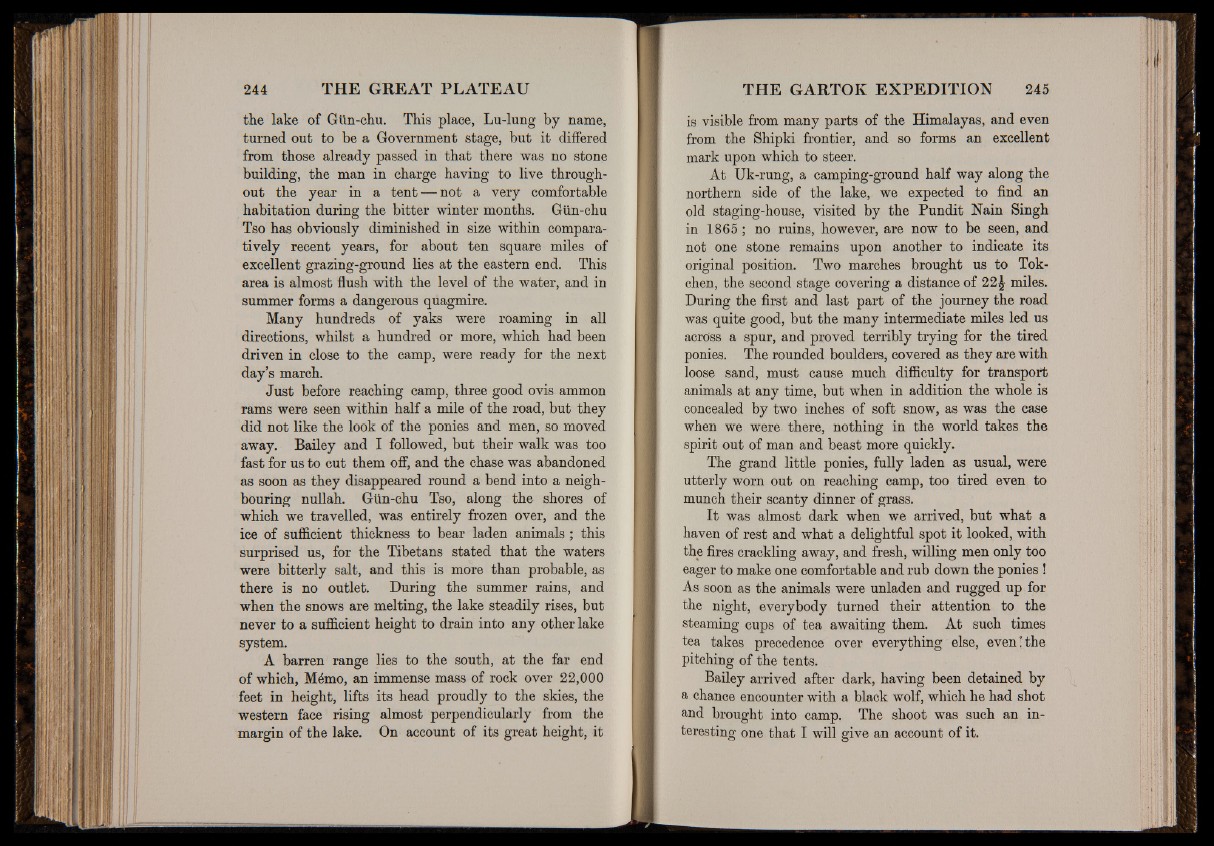
the lake of Gün-chu. This place, Lu-lung by name,
turned out to be a Government stage, but it differed
from those already passed in that there was no stone
building, the man in charge having to live throughout
the year in a tent — not a very comfortable
habitation during the bitter winter months. Gün-chu
Tso has obviously diminished in size within comparatively
recent years, for about ten square miles of
excellent grazing-ground lies at the eastern end. This
area is almost flush with the level of the water, and in
summer forms a dangerous quagmire.
Many hundreds of yaks were roaming in all
directions, whilst a hundred or more, which had been
driven in close to the camp, were ready for the next
day’s march.
Just before reaching camp, three good ovis ammon
rams were seen within half a mile of the road, but they
did not like the look of the ponies and men, so moved
away. Bailey and I followed, but their walk was too
fast for us to cut them off, and the chase was abandoned
as soon as they disappeared round a bend into a neighbouring
nullah. Gün-chu Tso, along the shores of
which we travelled, was entirely frozen over, and the
ice of sufficient thickness to bear laden animals ; this
surprised us, for the Tibetans stated that the waters
were bitterly salt, and this is more than probable, as
there is no outlet. During the summer rains, and
when the snows are melting, the lake steadily rises, but
never to a sufficient height to drain into any other lake
system.
A barren range lies to the south, at the far end
of which, Mémo, an immense mass of rock over 22,000
feet in height, lifts its head proudly to the skies, the
western face rising almost perpendicularly from the
margin of the lake. On account of its great height, it
is visible from many parts of the Himalayas, and even
from the Shipki frontier, and so forms an excellent
mark upon which to steer.
At Uk-rung, a camping-ground half way along the
northern side of the lake, we expected to find an
old staging-house, visited by the Pundit Nain Singh
in 1865 ; no ruins, however, are now to be seen, and
not one stone remains upon another to indicate its
original position. Two marches brought us to Tok-
chen, the second stage covering a distance of 22^ miles.
During the first and last part of the journey the road
was quite good, but the many intermediate miles led us
across a spur, and proved terribly trying for the tired
ponies. The rounded boulders, covered as they are with
loose sand, must cause much difficulty for transport
animals at any time, but when in addition the whole is
concealed by two inches of soft snow, as was the case
when we were there, nothing in the world takes the
spirit out of man and beast more quickly.
The grand little ponies, fully laden as usual, were
utterly worn out on reaching camp, too tired even to
munch their scanty dinner of grass.
It was almost dark when we arrived, but what a
haven of rest and what a delightful spot it looked, with
the fires crackling away, and fresh, willing men only too
eager to make one comfortable and rub down the ponies !
As soon as the animals were unladen and rugged up for
the night, everybody turned their attention to the
steaming cups of tea awaiting them. At such times
tea takes precedence over everything else, even!the
pitching of the tents.
Bailey arrived after dark, having been detained by
a chance encounter with a black wolf, which he had shot
and brought into camp. The shoot was such an interesting
one that I will give an account of it.